BioWare
Dragon Age: The Veilguard takes us back to Thedas
Dragons fly high.
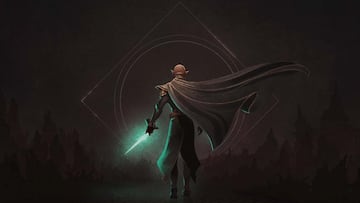
Nine years ago was the last time we had anything to do with the Dragon Age franchise. It was a downloadable piece of content that acted as an extended epilogue to Inquisition and attempted to reinforce the particular twist of that installment. In almost a decade, BioWare has stumbled a few times. From a new Mass Effect that failed to live up to the impressive original trilogy, to Anthem, a new IP that failed to take off. However, the Dragon Age franchise was in the studio’s plans and, after a name change (from Dread Wolf to The Veilguard), the world of Thedas is back.
Between betrayals and gods
Dragon Age: The Veilguard is the fourth title in the series of role-playing and action games developed by BioWare. This time we take control of Rook, a character we can create as we wish, who becomes an ally of Varric, a key character in the series. He is trying to stop his former Inquisition partner Solas from opening the Veil, the metaphysical barrier that separates the physical plane of Thedas from the Fade. After a failed attempt to stop him, Rook takes on the role of leader of a new group that will attempt to save the world not only from Solas’ plans, but also from new and more powerful threats: two elven gods released from their prison in the Fade.
In the game, we will travel across the north of Thedas, forming alliances, saving cities and doing everything we can to save the world. The game’s story builds on the foundations of its predecessors and other titles from the studio: choices and relationships affect the world. Our relationship with our companions will grow or shrink depending on our actions, either in certain dialogues or by interacting with them. Each of our companions, from the curious Bellara to the mysterious Lucanis to the determined Lace, represents one of the different factions in the northern region of Thedas and has its own purpose in this adventure, with special missions and arcs to unlock as we interact with them. This continues the studio’s tradition of creating well-balanced characters with whom you can identify. And if you’re a veteran of the series, yes, the romance theme is still there and feels freer than in previous titles.

As this is the fourth installment in the franchise, if you are a veteran of the series, you will find winks, references and even the special appearance of some characters that I will not mention in order to avoid spoilers. But if this is your first time playing, don’t worry, the game’s mythology is well balanced and presented in such a way that you can get to know elements and characters from the world of Thedas without feeling overwhelmed or not knowing exactly who they are.
Creating a better Rook
As for our character, Rook, he follows the line of the previous installment and you can choose between four available tribes (Human, Elf, Dwarf, and Qunari) as well as three classes (Warrior, Mage and Rogue). This time, your character’s background will be related to the factions within the game, and some of the characters you meet along the way will know a bit of history related to that faction. There will even be dialogue options related to that faction, as long as the requirement is met.
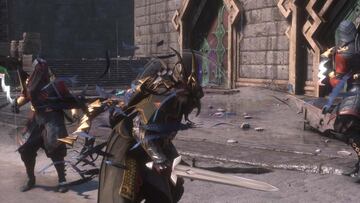
The character creator is quite robust and allows you to alter and modify your creation as much as possible. For those who want to recreate themselves in the game, or for those who want to create a character so ridiculous it will go viral on the internet, the options are there. There are, however, certain limitations, such as the eye color options or the styles of certain hairstyles and facial hair. However, the Character Creator allows us to add detail to other parts of our Rook’s face or body, which adds balance to the process. Of course, if at the end of the creation process, there’s something you don’t like about your character, you’ll always be able to tweak it to your liking throughout the game.
Get ready for combat
What kind of combat can you have? In addition to choosing your class, Rook will be able to specialize in different paths, making him a much more flexible character. Once a class has been chosen, points are available for the skill tree. Each class is divided into 3 specializations with paths in between. In my experience, I was playing with a rogue Rook who, in addition to being agile with his twin swords and attacking from a distance with his bow, when he reached a certain level I was able to specialize him to use more complex weapons, such as setting a booby trap to send smaller enemies flying or using an automated crossbow. Eventually, I felt that wasn’t what I needed, and thanks to the point system, I was able to move to a middle ground where I could also increase my health and improve my counterattack abilities. This change also applies to your loadout of four special attacks, so you have options that better suit the situation you’re in.
In addition, combat in Dragon Age: The Veilguard is extremely agile and demands your speed. Whether you’re in melee or ranged combat, you’ll be able to roll to dodge attacks and even counterattack if you stop enemy attacks in time. The enemies are varied and in some cases never rest. There will be everything from mercenaries who will bother you in some of the towns to Blight-infected monsters, dark mages, and larger creatures. And, of course, Dragon Age is not complete without the challenge of facing dragons.
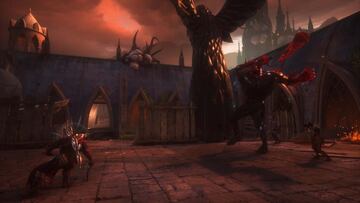
Part of the strategy is to choose your team based on the situation and their abilities. In fierce fights, you need someone who can take care of your energy regeneration and take advantage of the system where there are complementary attacks that can do even more damage. To this, we must add the option that Dragon Age: The Veilguard gives us to play with the skills of our companions with much smaller trees, as well as the improvement of weapons and accessories that, like a good RPG, will give us bonuses and advantages to resist attacks.
Finally, the game offers several difficulty levels, from one that focuses on getting to know the story with simpler battles, through a more balanced mode, to one that is a nightmare from which you will not be able to escape.
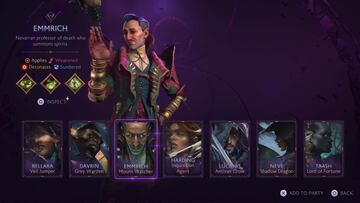
Traveling in northern Thedas
The world of Dragon Age has come a long way in the 10 years since Inquisition, and The Veilguard is a spectacular visual change. While its predecessor featured more realistic areas, the north of Thedas is a region where magic can be used, resulting in more impressive and vibrant cities. Cities such as Miranthous and Treviso are spectacularly designed, while natural locations such as the Arlathan Forest and the beaches of Rivain show the variety of the region’s landscape.
Each of the regions is extremely large. Although it is not an open world where we can move from one point to another at will, each area is large enough to get lost in, to get distracted by side quests, or to try to find all the secrets. In addition, some of our companions will have abilities that allow them to take different routes at certain points, such as Darvin calling his griffin to make way for us, or Lucanis invoking elements of the Fade to help us cross.
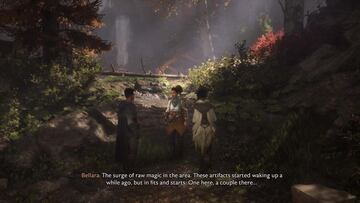
On the other hand, we have the world beyond this level, the famous Fade. Our base of operations will be The Lighthouse, which will allow each of the characters in the game to have their own room and see how it is decorated over time. From this base of operations, we will be able to use a workshop to improve our characters’ items and weapons, as well as transport ourselves to The Crossroads, a place that will allow us to connect with various points in the north of Thedas and move on to our next mission. Due to its magical nature, it will also have its own set of quests and secrets.
Visually, these scenarios are impressive and show the power of the generation. Despite the many elements on the screen, especially during fights, there are no frame drops, everything moves very smoothly. However, we did come across a few bugs that, while not affecting the gameplay, do detract from the immersion. For example, there are times when the characters can’t properly pass through a door or climb a stone to reach us, or there is a magic attack that floats. These are minor issues that can be fixed with patches.
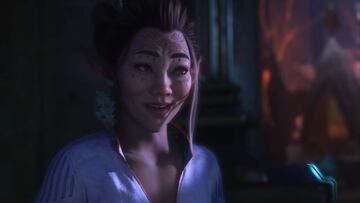
The world you change
Like any BioWare game, Dragon Age: The Veilguard is about choices. As well as the interactions you will have with your 7 companions, there will be crucial moments that will affect not only them, but also the north of Thedas and the various factions you work with. This can affect towns and locations, and even prevent you from completing side quests or increase the difficulty of some key moments later on. Maintaining a good relationship with these factions, from the Grey Guard to the Antivan Ravens to the Shadow Dragons to the Duel Vigils, will be an essential part of having them as allies, as well as more mundane aspects such as discovering new items in their shops. And, of course, every decision you make, whether with your companions or with the factions, will be reflected in the end.
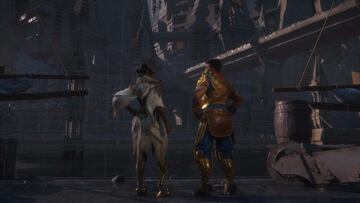
Dragon Age: The Veilguard is a title that manages to bring the new generation of BioWare back to the peak we knew. The world of Thedas is brilliant and leaves much to be discovered, although it is not devoid of detail. While the core gameplay remains the same and there are no major changes to the classic formula, nor are the choices complicated, there is greater flexibility in the way it seeks to engage players and even direct them to make changes throughout the game. In a 2024 where RPGs stand out, Dragon Age: The Veilguard will be something to talk about.